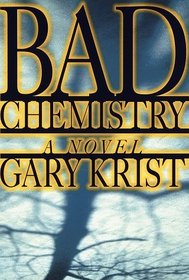Helpful Score: 1
Bad Chemistry revolves around Kate Theodorus, a former beat cop turned social worker. After a discomforting opening--a party at which a dog is mysteriously set aflame--Kate's husband Joel heads out to a convenience store for some microwave popcorn. Hours pass, then days, and still he fails to return. Has Joel been kidnapped? Has something gone seriously wrong with his importing business (which does, after all, sell "natural" pharmaceuticals from the Amazon basin)? With the aid of the most unappealing 14-year-old computer hacker in existence, Kate takes the case into her own hands, swiftly stumbling across cybercrime, robbery, and a selection of corpses. As the mystery of Joel's disappearance unravels, Krist keeps the pages turning very nicely. What's more, he makes the missing-person motif work metaphorically, as a figure for all of our inherently ambiguous relationships: "What a mystery marriage is," Kate thinks, "any marriage, every marriage. You try to make it good, but you never really know if you're succeeding." Fusing psychological insight with a cops-and-robbers plot isn't easy, but for the most part, Krist has pulled off this bit of literary chemistry with admirable expertise.
How well do you know your spouse? What if the person you married was keeping secrets from you? What if the one you loved is involved in something so dangerous it could destroy you both? Kate Theodorus is about to find out....
Quite suspenseful, enjoyed it a lot
Quite suspenseful, enjoyed it a lot
This book poses the question...how much do we really know about the people we love ...or about ourselves. When Kates husband dissapears, she embarks on a search for him and the truth about the parts of his life he has hidden from her. FAST MOVING AND COMPELLING.
During the 1980s, Gary Krist won a solid reputation as a decidedly literary author. In collections such as Bone by Bone and The Garden State, his characters wrestle with a variety of down-to-earth dilemmas--family discord, bum relationships, career confusions--and their success or failure at resolving these problems makes for elegant and intelligent narratives. This time around, however, Krist applies his psychological deftness to a more pulse-pounding genre, attempting to produce that chimerical creature, the thinking person's thriller. Has he succeeded?
That he has. Bad Chemistry revolves around Kate Theodorus, a former beat cop turned social worker. After a discomforting opening--a party at which a dog is mysteriously set aflame--Kate's husband Joel heads out to a convenience store for some microwave popcorn. Hours pass, then days, and still he fails to return. Has Joel been kidnapped? Has something gone seriously wrong with his importing business (which does, after all, sell "natural" pharmaceuticals from the Amazon basin)? With the aid of the most unappealing 14-year-old computer hacker in existence, Kate takes the case into her own hands, swiftly stumbling across cybercrime, robbery, and a selection of corpses. As the mystery of Joel's disappearance unravels, Krist keeps the pages turning very nicely. What's more, he makes the missing-person motif work metaphorically, as a figure for all of our inherently ambiguous relationships: "What a mystery marriage is," Kate thinks, "any marriage, every marriage. You try to make it good, but you never really know if you're succeeding." Fusing psychological insight with a cops-and-robbers plot isn't easy, but for the most part, Krist has pulled off this bit of literary chemistry with admirable expertise.
That he has. Bad Chemistry revolves around Kate Theodorus, a former beat cop turned social worker. After a discomforting opening--a party at which a dog is mysteriously set aflame--Kate's husband Joel heads out to a convenience store for some microwave popcorn. Hours pass, then days, and still he fails to return. Has Joel been kidnapped? Has something gone seriously wrong with his importing business (which does, after all, sell "natural" pharmaceuticals from the Amazon basin)? With the aid of the most unappealing 14-year-old computer hacker in existence, Kate takes the case into her own hands, swiftly stumbling across cybercrime, robbery, and a selection of corpses. As the mystery of Joel's disappearance unravels, Krist keeps the pages turning very nicely. What's more, he makes the missing-person motif work metaphorically, as a figure for all of our inherently ambiguous relationships: "What a mystery marriage is," Kate thinks, "any marriage, every marriage. You try to make it good, but you never really know if you're succeeding." Fusing psychological insight with a cops-and-robbers plot isn't easy, but for the most part, Krist has pulled off this bit of literary chemistry with admirable expertise.




